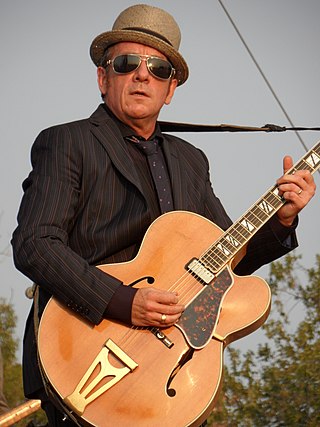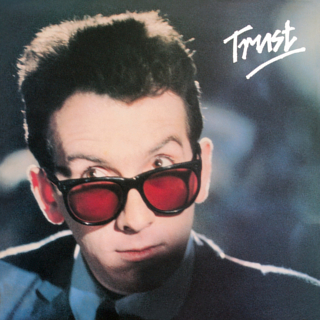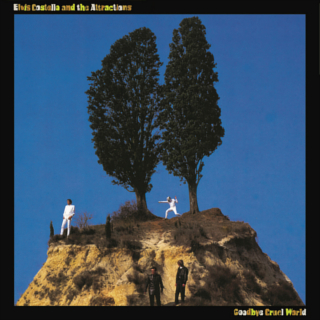Related Research Articles

Declan Patrick MacManus, better known by his stage name Elvis Costello, is an English songwriter, singer, record producer, author and television presenter. Music critics consider Costello to be one of the most gifted and versatile songwriters of his generation. His first album, My Aim Is True (1977), is widely regarded as one of the best debut albums in popular music history. The album spawned no hit singles, but contains some of Costello's best-known songs, including the ballad "Alison". Costello's next two albums, This Year's Model (1978) and Armed Forces (1979), recorded with his backing band the Attractions, helped define the new wave music genre. From late 1977 through early 1980, each of the eight singles he released reached the UK Top 30. His biggest hit single, "Oliver's Army" (1979) sold more than 400,000 copies in Britain. He has had more modest commercial success in the US but has earned much praise among music critics. From 1977 through the early 2000s, Costello's albums regularly ranked high on the Village Voice Pazz & Jop critics' poll, with This Year's Model and Imperial Bedroom (1982) voted the best album of their respective years. His biggest US hit single, "Veronica" (1989), reached number 19 on the Billboard Hot 100.

My Aim Is True is the debut studio album by English singer-songwriter Elvis Costello, originally released in the United Kingdom on 22 July 1977 through Stiff Records. Produced by Stiff artist and musician Nick Lowe, the album was recorded from late 1976 to early 1977 over six four-hour studio sessions at Pathway Studios in Islington, London. The backing band was California-based country rock act Clover, who were uncredited on the original release due to contractual difficulties. At the time performing as D.P. Costello, Costello changed his name to Elvis after Elvis Presley at the suggestion of the label, and adjusted his image to match the rising punk rock movement.

Punch the Clock is the eighth studio album by the English singer-songwriter Elvis Costello, and his seventh with the Attractions—keyboardist Steve Nieve, bassist Bruce Thomas and drummer Pete Thomas. It was released on 5 August 1983 through F-Beat Records in the United Kingdom and Columbia Records in the United States. Produced by Clive Langer and Alan Winstanley, the album was Costello's attempt at making a commercial record following years of dwindling commercial success. It was recorded at London's AIR Studios in early 1983 and features contributions from the TKO Horns and Afrodiziak.

Trust is the fifth studio album by the English singer-songwriter Elvis Costello, and his fourth with the Attractions—keyboardist Steve Nieve, bassist Bruce Thomas and drummer Pete Thomas. It was released on 23 January 1981 through F-Beat Records in the United Kingdom. His fifth consecutively produced album by Nick Lowe, who was assisted by engineer Roger Béchirian, the album was recorded in London from October to November 1980 between DJM and Eden Studios. The sessions were riddled with alcohol and drug issues and tensions were high between the band members. Squeeze vocalist Glenn Tilbrook and the Rumour guitarist Martin Belmont made guest appearances on "From a Whisper to a Scream".

Blood & Chocolate is the eleventh studio album by the British rock singer and songwriter Elvis Costello, released in the United Kingdom as Demon Records XFIEND 80, and in the United States as Columbia 40518. It is his ninth album with his long-standing backing band known as 'The Attractions'. After his previous album King of America with producer T-Bone Burnett and different musicians, this album reunited him with producer Nick Lowe and his usual backing group the Attractions. It peaked at No. 16 on the UK Albums Chart, and No. 84 on the Billboard 200. In The Village Voice's annual Pazz & Jop critics poll for the year's best albums, Blood & Chocolate finished at number 9. The album was also included in the book 1001 Albums You Must Hear Before You Die. In 2000 it was voted number 475 in Colin Larkin's All Time Top 1000 Albums.

King of America is the tenth studio album by the English singer-songwriter Elvis Costello, released on 21 February 1986. Co-produced by Costello and T Bone Burnett, the album originated following a series of tours the two made under the name "the Coward Brothers". Recording took place in mid-1985 at various studios in Los Angeles, California, with a group of American session musicians dubbed "the Confederates". Selected by Burnett, they included Ray Brown, Earl Palmer and former members of Elvis Presley's TCB Band. Costello's regular backing band, the Attractions, were intended to appear on half of the album before poor sessions led to them appearing on only one track, "Suit of Lights".

"Oliver's Army" is a song written by Elvis Costello and performed by Costello and the Attractions, from the former's third studio album Armed Forces (1979). The song is a new wave track that was lyrically inspired by the Troubles in Northern Ireland and includes lyrics critical of the socio-economic components of war. Costello had travelled to Northern Ireland and was influenced by sights of British soldiers patrolling Belfast. Musically, the song features a glossy production and a keyboard performance inspired by ABBA, creating a juxtaposition between the lyrics and music that both critics and Costello have pointed out.

Goodbye Cruel World is the ninth studio album by the English singer-songwriter Elvis Costello, and his eighth with the Attractions—keyboardist Steve Nieve, bassist Bruce Thomas and drummer Pete Thomas. It was released on 18 June 1984 through F-Beat Records in the United Kingdom and Columbia Records in the United States. Produced by Clive Langer and Alan Winstanley, who returned from 1983's Punch the Clock, the album was recorded at London's Sarm West Studios in March 1984 during a period of turmoil for the artist. The problematic sessions included disagreements between Costello and the producers over the album's direction and high tensions amongst the Attractions.

"New Amsterdam" is a song written and performed by new wave musician Elvis Costello on his 1980 album, Get Happy!! Written about the New World and New York, the recording of the song that appears on Get Happy!! was a demo that Costello had recorded in Pimlico.

"Clubland" is a song written by new wave musician Elvis Costello and performed by Costello and the Attractions on their 1981 album, Trust. Written in 1980, the song was performed live in festivals before the album's release. The lyrics, inspired by the band's most recent tour, describe life in nightclubs, while the music includes inspiration from The Police.

"You Little Fool" is a song written by new wave musician Elvis Costello and performed by Elvis Costello and the Attractions on their 1982 album, Imperial Bedroom. The lyrics detail a teenage girl's romantic encounter with an older man.

"Blue Chair" is a song written by new wave musician Elvis Costello and recorded by Costello with his backing band the Attractions. The song first appeared on Costello's 1986 album, Blood & Chocolate. First intended for Costello's previous album King of America, the song was scrapped during that session and reworked with the Attractions around Steve Nieve's piano part.

"13 Steps Lead Down" is a song written and performed by new wave musician Elvis Costello that was first released on his 1994 album Brutal Youth. Written quickly during a day-long session, the song features lyrics referencing El Escorial and the twelve-step recovery movement. The track is one of those on Brutal Youth that features the reunited Attractions, Costello's longtime backing band.

"Brilliant Mistake" is a song written and performed by new wave musician Elvis Costello that was first released on his 1986 album King of America. Written about Costello's experiences in America, the song features introspective lyrics and a performance from the Confederates, who performed on the track after his usual backing band the Attractions could not perform to Costello's liking.

"I Hope You're Happy Now" is a song written by new wave musician Elvis Costello and recorded by Elvis Costello and the Attractions. The track was released on his 1986 album Blood & Chocolate after several failed attempts to record the song for earlier releases.

"Watch Your Step" is a song written by new wave musician Elvis Costello and performed by Costello and the Attractions on their 1981 album, Trust. Originating from lyrics he wrote as a 20-year-old, "Watch Your Step" was inspired by Costello's experiences on tour as well as by dub music. The song was originally a louder rock song, but the final released version is slower and quieter.
"The Other End (Of the Telescope)" is a song by American band 'Til Tuesday, which was released in 1988 on their third and final studio album Everything's Different Now. The song was written by Aimee Mann and Elvis Costello. Costello recorded his own version of the song for his 1996 album All This Useless Beauty.
"Next Time Round" is a song written by new wave musician Elvis Costello and recorded by Elvis Costello and the Attractions. The track was released on his 1986 album Blood & Chocolate after an earlier attempt to record the song for his previous album King of America was scrapped.
"Indoor Fireworks" is a song written and performed by new wave musician Elvis Costello that was first released on his 1986 album King of America. Written as a eulogy for a broken relationship, the song utilizes a central metaphor of fireworks and took inspiration from Costello's failed marriage. On the song, Costello is supplemented by the studio professionals of the Confederates, as on most of King of America.
"Jack of All Parades" is a song by English singer-songwriter Elvis Costello, which was released on his tenth studio album King of America (1986). The song was written by Costello, credited under his real name Declan MacManus, and produced by T Bone Burnett, Costello and Larry Kalman Hirsch. As a musician, Costello is credited on the track as "The Little Hands of Concrete". It is a love song, inspired by his new relationship with Cait O'Riordan of the Pogues, and is unusual in Costello's catalogue for being a positive love song.
References
Citations
- 1 2 Flanagan, Bill (1986). "McManus Attack". Musician. Amordian Press. Retrieved 25 January 2023.
- ↑ King of America (Liner notes). Elvis Costello. 1995.
{{cite AV media notes}}: CS1 maint: others in cite AV media (notes) (link) - 1 2 3 4 King of America (Liner notes). Elvis Costello. 2005.
{{cite AV media notes}}: CS1 maint: others in cite AV media (notes) (link) - ↑ Gottlieb, Jed (21 February 2021). "How Elvis Costello Reinvented Himself on 'King of America'". Ultimate Classic Rock. Retrieved 25 January 2023.
- ↑ Anderson, Rick. "Suit of Lights by Elvis Costello - Track Info | AllMusic". AllMusic . Retrieved 25 January 2023.
- ↑ Thomson 2006.
- ↑ Jones, Allan (March 1, 1986). "Crown time is over". Melody Maker.
- ↑ Kent, Nick (February 22, 1986). "Crowning glory". Melody Maker.
- ↑ Young, Jon; Robbins, Ira. "Elvis Costello". Trouser Press. Retrieved 25 January 2023.
Sources
- Thomson, Graeme (2006). Complicated Shadows: The Life and Music of Elvis Costello. Canongate U.S. ISBN 978-1841957968.